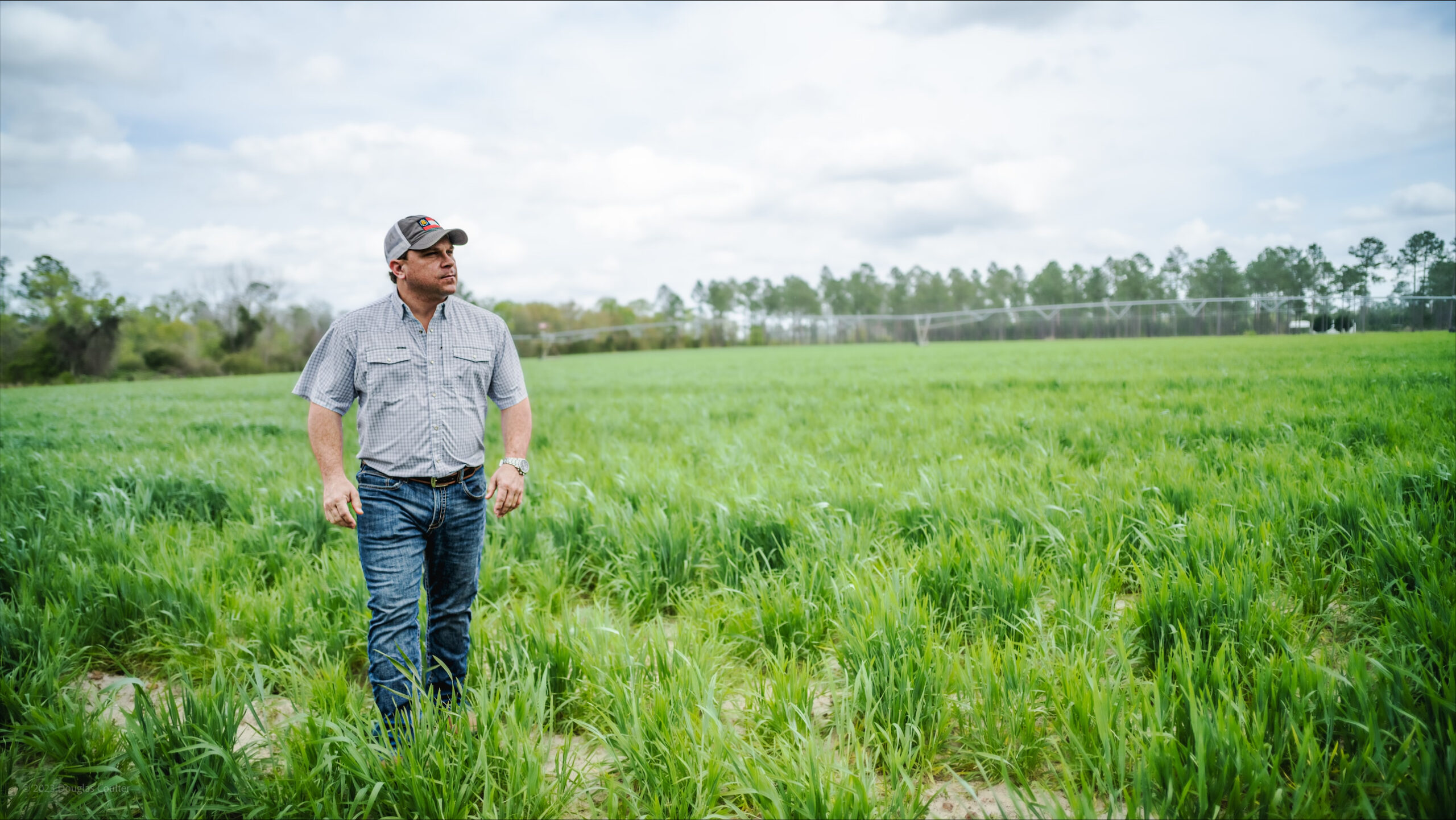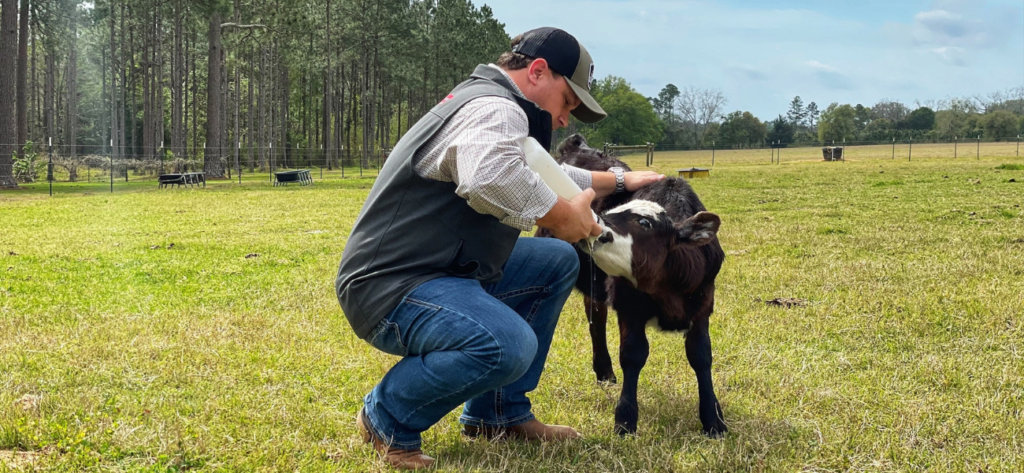Stay ahead of the curve as a political insider with deep policy analysis, daily briefings and policy-shaping tools.
Request a DemoGeorgia’s new ag commissioner says agriculture is more than ‘cows, sows & plows’

A native of Ocilla, Georgia, Agriculture Commissioner Tyler Harper is a seventh-generation South Georgia farmer with a peanut, cotton, beef cattle, and timber operation on the same land his family has farmed for over 125 years. (Credit: Georgia Department of Agriculture)
Tyler Harper makes no apologies for vigorously preserving and guarding Georgia’s farmland.
“Agriculture at the end of the day is national security,” Georgia’s newest agriculture commissioner told State Affairs. “We’ve got to ensure that we’re protecting our food supply and providing the food, the fiber, the shelter for ourselves right here at home.”
Harper became Georgia’s 17th agriculture commissioner in January, making him head of the nation’s oldest state agriculture department, which has 550 employees and an annual budget of about $70 million.
Agriculture “made me who I am,” said Harper, a bachelor and farmer with a penchant for cowboy hats.
Agriculture also made the Peach State what it is. The $75 billion agriculture field is Georgia’s No. 1 industry, providing paychecks for roughly 1 in 7 Georgians.
A native of Ocilla, Harper is a seventh-generation South Georgia farmer with a peanut, cotton, beef cattle, and timber operation on the same land his family has farmed for over 125 years. He makes the three-hour trek from Atlanta to his hometown most weekends.

State Affairs caught up with Harper on his family’s 1,500-acre spread to talk about the widely-anticipated federal Farm Bill, building an education-to-ag pipeline, a stronger farm-to-fork path in Georgia, and the significance of Agriculture Week, aka “Ag Week”, which starts today and runs through Sunday. (This year’s theme is “Celebrating Farmers, Food & Fiber.”)
The conversation has been edited for clarity and brevity.
Q. What are the top issues facing agriculture?
A. Some of the big issues that impact us and all agriculture are issues out of D.C. Federal overreach and federal policies make it more difficult for the agricultural industry, farmers and producers. In the end, it increases costs at the grocery store and causes more issues for the consumer.
We’re talking about WOTUS — the Waters of the U.S. — ruling that the EPA most recently put out that will cause increased cost on the farm and, in turn, it causes increased cost to the consumer at the grocery store. We’re talking inflation, which has been a significant issue in agriculture, from fertilizer prices, seed prices, feed prices. It has really made it a lot more difficult in the ag industry. I understand that in my role on my farm because that’s what I’m dealing with every day, just like every other producer across the state and that inflation turns into issues and the food supply chain at the grocery store.
Those are things that, if we have the right type of policies on the federal level, help us ensure that we’re producing more of our fertilizer here at home.
We’ve seen this [fertilizer] issue come out of the Ukraine-Russia conflict. I think most folks are starting to realize how much dependency we have as a nation on global commerce, which is important and vital, as part of our economy. But we need to be as energy-independent and food-independent as we can be. Having federal policies that help guide us in that direction will help make that happen.
Q. What can Georgia do to make that happen?
A. We can ensure we have policies on the state level to help offset issues our producers and those in the ag industry are faced with. [We can do that] by allowing our farmers and producers to have a level-playing field in the state as best as we can. We can encourage consumers to buy Georgia Grown products. We do that by ensuring that we build the Georgia Grown brand.
We work every day to ensure that we’re preserving the family farm and addressing labor and workforce development issues as best we can. We’re working to ensure individuals have the best level of education when it comes to the ag industry and [letting] young men and women know they can get involved in the agricultural industry and that there are opportunities for them.
We’ve done that by extending the agricultural education curriculum in our state. Last year, we passed the bill to permanently extend that to the K5 classrooms. So now in Georgia, it’s possible to get an ag education from kindergarten to adulthood.
At the same time, we’ve got to work to give them access to capital so they can get in the business. We’ve also got to work to preserve the family farm on the back end, preserving the family farm and working to ensure our farmers and producers have the resources and tools they need as well as the protections they need to be successful every single day.
IN HIS FIRST 60 DAYS IN OFFICE, HARPER HAS…
- Made key staff hires. A chief of staff, inspector general and a policy director.
- Restored the agency’s law enforcement division. Traditionally, the Georgia Department of Agriculture had a law enforcement division which was discontinued under the previous commissioner. Harper and the newly appointed inspector general, Harlan Proveaux, restored this critical function of the Department.
- Took immediate action on soil amendments. Harper initiated a 90-day review of the department’s rules and regulations within the Soil Amendment Program to ensure the new rules do enough to address the issues raised by residents, community leaders and industry professionals. Harper also worked with House Speaker Jon Burns and House Appropriations Chairman Matt Hatchett to secure an additional $550,000 in the state budget to help strengthen the Soil Amendment Program.
Q. Is the federal Farm Bill slated to come up this year?
A. Yes. We’ve been having conversations with some of our colleagues on the federal level about how it impacts Georgia and what we would like to see to help protect and ensure Georgia farmers or producers are protected and that they have the resources they need.
Q. What Georgia issues would you like to see as it relates to the bill?
A. The peanut program is significantly important to Georgia. Fifty percent of the peanuts produced in the nation are produced in Georgia. So, obviously, that is a very critical part of the Farm Bill.
But it’s not just peanuts. It’s all the commodities: cotton or corn or anything in between and the programs that impact our row crops, commodities, our livestock industry, and also [we’re] working to include for the first time some provisions related to our fruit and vegetable industry in the state. That’s an industry that typically has not had the same resources other commodities have had in the Farm Bill.
Q. What ag-related bills are you keeping an eye on in the Georgia Legislature?
A. Senate Bill 220 which is being carried by my good friend and Senate Ag Committee Chairman Russ Goodman. It’s the Georgia Farmland Conservation Fund. This would establish a fund in Georgia, similar to what’s happened in 29 other states, to protect farmland for generations to come.
We’ve got to ensure we’re protecting our food supply and providing the food, fiber and shelter for ourselves at home. Land is one of the most vital components of agriculture.
We’re keeping our eyes on other bills, like SB 132 — the foreign ownership of farmland. We’ve been very involved in that conversation and ensuring that farmland here in Georgia is owned and operated by those who live here.
We’re involved with conversations related to the hemp program in Georgia. We oversee that. We also have a citrus commodity commission that we’re pushing through.
Q. You championed the “Freedom to Farm” law through the General Assembly last year. The law appears to make it tougher for people who live near agricultural producers to file nuisance claims over things like noise and smells. What was your intention with this bill? And how do you square that with the realities people face when living near ag producers?
A. It’s important we protect our state’s No. 1 industry, family farms and operations and producers. Agriculture is national security.We’ve got to work every day to ensure farmers and producers have the resources and tools they need to ensure that we’re providing the food, the fiber, the shelter as much as we can here. [The law] gives you opportunities to ensure that you’re operating every single day in the normal operations of agricultural business.
Q. Sure, but what about people who may have to live next door?
A. At the end of the day, if farmers and producers are in violation of the Clean Water Act, if they’re in violation of environmental policy, if they’re in violation of EPD [Environmental Protection Division] rules and regs and laws that protect water quality and air quality, there are lawsuits and actions that can be taken against those producers that violate those statutes. This [law] does not protect [ag producers] from egregious actions. It doesn’t protect you from doing things that are illegal.
We’re going to work to ensure the department, our rules and regs ensure farmers and consumers are protected and our No. 1 industry is successful. And that food is on the grocery store shelves and our food supply chain is safe and secure.
Q. Earlier this month, the Georgia Senate passed the Food Insecurity Eradication Act. If it becomes law, it would set up the Security Food Security Advisory Council to end food insecurity in Georgia. How closely will you be involved in this issue and how is the state ag department currently tackling food insecurity?
A. We’ve been tracking that legislation and trying to see what that would look like. At the department, we’ve been involved in working to tackle food insecurity in our state.We’re working to provide the needed resources not only for farmers and producers but families and consumers alike. We’re working to bridge that divide between the farm and the fork. Our team is doing that every single day whether it’s through the Farm to Food Bank, an $800,000-a-year program, or the Local Food Procurement Assistance program, which is financed with a $23 million grant from the federal government.
Q. This week is Ag Week. What is the significance of Ag Week for Georgians?
A. Ag Week is extremely important in our state. It’s an awesome opportunity for us to tell the story of agriculture to those who don’t understand or know what agriculture is about. We look forward to spreading the message across the state that Georgia agriculture is way more than cows, plows and sows. It’s a dynamic industry with opportunities for individuals with a wide variety of skill sets and backgrounds.
Our goal at the department is to ensure we’re making Georgians’ lives better, whether it’s at the gas pump, the grocery store, a farm, a fuel pump or everywhere in between.
Q. What’s your favorite state festival?
A. The Sweet Potato Festival. That’s my hometown festival. It’s in October every year. And, obviously, the Georgia National Fair is always a favorite of mine.
Q. As ag commissioner, you get to set the opening day for the Vidalia onion season. When does that start?
A. April 17 will be the kickoff for the state.

the tyler harper files
- Title: Agriculture commissioner of Georgia
- Age: 36
- Birthplace: Irwin County, Georgia.
- Hometown: Ocilla, Georgia.
- Education: Associate’s degree in agriculture from Abraham Baldwin Agricultural College and a bachelor’s degree in agricultural engineering from the University of Georgia’s College of Agriculture.
- Career: Member of the Georgia State Senate representing the 7th District, 2013-2023; elected agriculture commissioner in 2022 and took office in January 2023.
- Hobbies: Hunting, fishing, flying (“I’m rated to fly helicopters and airplanes.”), playing piano and acoustic guitar and watching the Georgia Bulldogs play.
- Family: Single.
- What job would you want to be doing if you weren’t in this one: I’d be enjoying more time on the farm.
You can reach Tammy Joyner on Twitter @lvjoyner or at [email protected]. Joyner is State Affairs’ senior investigative reporter in Georgia. A Georgia transplant, she has lived in the Peach State for nearly 30 years.
Twitter @STATEAFFAIRSGA
Facebook @STATEAFFAIRSUS
Instagram @STATEAFFAIRSGA
LinkedIn @STATEAFFAIRS
Learn more about what the agriculture industry means in Georgia with our fast facts on the Georgia Department of Agriculture.
Professionals still face licensing delays amid state’s transition to online system
The Gist Georgia’s professionals and business owners are still struggling to obtain professional licenses in a timely manner. As the Secretary of State’s Office rolls out its new Georgia Online Application Licensing System to expedite the process, the efficiency of this new process is being put to the test. What’s Happening Thursday morning at the …
Controversy over AP African American Studies class grows
Rashad Brown has been teaching Advanced Placement African American Studies at Atlanta’s Maynard Jackson High School for three years. He’ll continue to do so — even though the state’s top education official removed it from the list of state-funded course offerings for the upcoming school year. While Brown prepares to start teaching his class on …
Students, teachers, lawmakers blast decision to end AP African American history classes
ATLANTA — A coalition of lawmakers, civil rights leaders, clergy, educators and students Wednesday called on the state’s education czar to rescind his decision to drop an advanced placement African American studies class from the state’s curriculum for the upcoming school year. “This decision is the latest attack in a long-running GOP assault on Georgia’s …
Kamala Harris’ presidential bid reinvigorates Georgia Democrats
Georgia Democrats have gained new momentum heading into the November election, propelled by President Joe Biden’s decision to bow out of his reelection bid and hand the reins to Vice President Kamala Harris. The historic decision, announced Sunday, is expected to prove pivotal in the national and state political arenas and breathe new life and …




